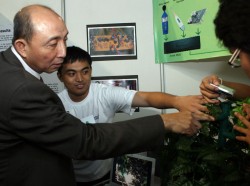A student project that uses telecommunications technology to speed up the detection of dengue cases won the grand prize in last Wednesday’s 7th Smart Wireless Engineering and Education Program (Sweep) Innovation and Excellence Awards in the SMX Convention Center at the SM Mall of Asia.
The student team from Bulacan State University (BSU) automated and sped up the detection of dengue through blood platelet counting using a portable capturing device that connected via mobile Internet to a digital analyzer machine.

The project, 3D: Dengue Detecting Device, won P500,000 in cash through Smart Money for the student team led by Donn Angelo Teodoro and another P500,000 in grants for the school.
Holy Cross of Davao College, meanwhile, got 2nd place for its system that automatically alerts maritime authorities in cases of overloading of vessels. The system uses sensors to detect overloading of ships and then automatically warns authorities through text messages. The student team led by Bobby Jay Carmelotes won P300,000 in cash through Smart Money and another P300,000 in grants for their school.
Third place went to Batangas State University for its drip irrigation system that used GSM technology and various sensors. The Smart Farmbihira system is capable of automatically watering and fertilizing a plantation at a set time or manually through a text message. The system also notifies the farmer on the condition of the soil and the harvest time of the crop. With the win, the student team led by Josephine Medina got P150,000 in cash through Smart Money while the school won P150,000 in grants.
Smart also handed out a special innovation award to a University of Baguio project that used the force of vehicles passing through a street to generate electricity to light up street lamps. A Smart official said they decided to hand out the special award because the project was “so far out and ahead of its time.”
The three winning projects bested seven other entries from Smart’s partner schools all over the country.
Cebu was represented by a team from the University of San Carlos (USC), which submitted a system that used sensors and telecommunications technology to warn forestry officials in cases of illegal logging.
The Preventive Illegal Logging Monitoring Endeavor (Prime) used monitors to detect chainsaw sounds and SMS and GSM technology to send out alerts. Whenever an alert is triggered, the system initiates a phone call to a designated recipient so that the person can listen and confirm whether the sound is really that of a chainsaw.
Prime was set up by a student team led by Vince Elizaga, who thought of the system after learning of the illegal logging in the Binahaan Watershed in Albuera, Leyte. He said the Community Environment and Natural Resources Officer (Cenro) of the watershed has expressed interest in deploying the system. Each Prime node can cover 1.5 hectares.
In last week’s awarding, Philippine Long Distance Telephone Co. president and chief executive officer Napoleon Nazareno said next year’s Sweep Innovation and Excellence Award will be different because of a change in focus toward mobile applications.
Meanwhile, Science and Technology Education Center (Stec) — High School in Basak, Lapu-Lapu City went home with four major awards in the Doon Po Sa Amin (DPSA) Learning Challenge, which was held simultaneously with Sweep. DPSA is part of Smart Communications’ corporate social responsibility project that aims to encourage teachers and students to use the Internet to generate information and educational materials on their respective communities.
Stec High School’s Lato: Golden Mines, which studied seaweeds in Mactan Island, won the Best in Booth Exhibit, the texters’ choice for booth exhibit and the DPSA award for science, technology and health.
Another Stec High School entry, Kasugiran: A Reagent to Culture, won the award for History and Society. Kasugiran looked into the myths and legends in Lapu-Lapu City.
Stec High School principal Ricardo Cayacap Jr. described the win as “very satisfying” for the team and the school. Cayacap said they were very thankful for projects like the DPSA because these teach students to work hard and exercise their leadership skills. He said student projects and efforts that were “unrecognized before” are now given importance through projects like the DPSA.
Max is a journalist and blogger based in Cebu. He has written and edited for such publications as The Freeman, The Independent Post, Today, Sun.Star Cebu, Cebu Daily News, Philstar Life, and Rappler.
He is also a mobile app and web developer and co-founded InnoPub Media with his wife Marlen.

Leave a Reply